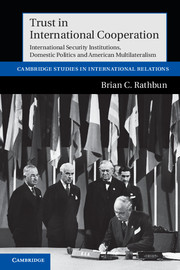 Trust in International Cooperation
Trust in International Cooperation Published online by Cambridge University Press: 05 June 2012
This is not a modest book. In its pages, I contend that the way that most in the field go about explaining international cooperation and the creation of international organizations, as the rational and functional response to objective security environments marked by uncertainty, is almost always too narrow, often obvious, and sometimes exactly wrong. Drawing on insights from social psychology, I contend that trust, rather than distrust, drives the institutionalization of cooperation and the construction of multilateral institutions. And the type of trust that matters, the “generalized” variety, is dispositional, an attribute of decision-makers that varies even in the same structural situation. This book is decidedly “old school,” seeking to provide better answers to old questions in the field – What explains international cooperation? Why do states create international organizations? – with new tools. In the course of writing this book, I have become convinced that some of the most foundational issues in international relations cannot be adequately addressed without attention to psychology. Like many, given our field's dispositions (and prejudices), I originally resisted its insights as reductionist and lacking external validity. I am now a convert. I hope to change readers’ minds as well, including those already drawn to psychology but who self-ghettoize themselves in the field of foreign policy analysis with the mistaken belief that international relations is somehow a bridge too far.
Writing a preface for a new book is tremendously gratifying, particularly as books are always the culmination of a long process and each has its own story. This book about American multilateralism actually has its roots in Europe. It began with an observation I made while an undergraduate study abroad student in Vienna observing the tortured ratification process of the Maastricht Treaty in Western Europe in 1992. Sitting in Vienna cafés reading the now-defunct European newspaper, I noticed that conservative parties in particular seemed to resist encroachments on national sovereignty, but I didn't know why.
To save this book to your Kindle, first ensure [email protected] is added to your Approved Personal Document E-mail List under your Personal Document Settings on the Manage Your Content and Devices page of your Amazon account. Then enter the ‘name’ part of your Kindle email address below. Find out more about saving to your Kindle.
Note you can select to save to either the @free.kindle.com or @kindle.com variations. ‘@free.kindle.com’ emails are free but can only be saved to your device when it is connected to wi-fi. ‘@kindle.com’ emails can be delivered even when you are not connected to wi-fi, but note that service fees apply.
Find out more about the Kindle Personal Document Service.
To save content items to your account, please confirm that you agree to abide by our usage policies. If this is the first time you use this feature, you will be asked to authorise Cambridge Core to connect with your account. Find out more about saving content to Dropbox.
To save content items to your account, please confirm that you agree to abide by our usage policies. If this is the first time you use this feature, you will be asked to authorise Cambridge Core to connect with your account. Find out more about saving content to Google Drive.